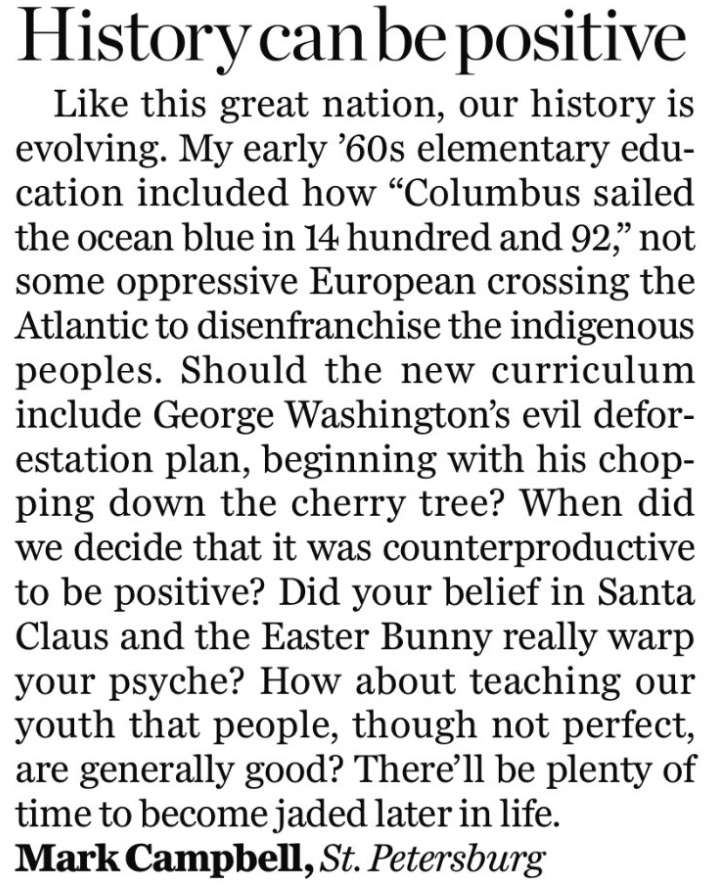Black smoke billows from fires during the Tulsa Race Massacre of 1921, in the Greenwood District, Tulsa, Oklahoma, US, June 1921. (Photo by © CORBIS/Corbis via Getty Images)
Email from a reader:
I taught U.S. History and APUSH for 40 years. I never used a textbook that even mentioned the Tulsa Massacre. There was no reference in the AV material ancillary text. The College Board which governs the APUSH curriculum (which is very comprehensive) never included it in their outline.
It was never included in any post graduate course I took or in service program. This was only 100 years ago!Christine
**
History is supposed to be about remembering. But it is also about forgetting and ignoring.
Which brings us to the ongoing fight over how to teach about racism. That debate tends to obscure the larger question we are wrestling with: What kind of history do we want?
That’s not a trivial question, because it revolves around the question of how societies describe themselves.
Decisions about what we teach and what we ignore are never value neutral. It is never merely the recitation of facts or dates. All societies tell their collective stories that define their identities.
So what kind of history do we want? Stories that make us feel good about ourselves? A tool for teaching patriotism? Or do we see it as an opportunity for exploring inconvenient truths that might lead to self-criticism (and possibly redemption)?
During the debate in Texas over teaching about the history of racism, one of the sponsors of the legislation said in a statement to the Texas Tribune that schools should emphasize “traditional history, focusing on the ideas that make our country great and the story of how our country has risen to meet those ideals.”
But what if our country has not always risen to meet those ideals?
Here’s another take:


This, of course, isn’t so much history as self-affirming happy talk. (The reference to Santa Claus and the Easter Bunny are perhaps giveaways.) At the margins, this kind of “positive” history becomes indistinguishable from propaganda.
But it also creates dilemmas: Where does the Tulsa race massacre fit into this rah-rah best-of-all-worlds notion?
All of this provides some context for President Biden’s visit to Tulsa yesterday.
“For much too long, the history of what took place here was told in silence,” Mr. Biden said. “While darkness can hide much, it erases nothing.”
Mr. Biden… was in Tulsa to shed light on a painful part of the country’s history. He recalled in detail the horror that occurred from May 31 to June 1, 1921, when angry white people descended on Greenwood, killing as many as 300 people and destroying more than 1,250 homes.
“My fellow Americans, this was not a riot,” Mr. Biden said, as people in the crowd rose to their feet. “This was a massacre.”
A man was strapped to a truck and dragged through the street, the president said. The bodies of a murdered family were draped over a fence outside their home. An older couple was shot while praying.
Biden explicitly challenged the notion that it was somehow patriotic to white wash our past.
“We do ourselves no favors by pretending none of this ever happened,” Biden said.
“We should know the good, the bad, everything. That’s what great nations do: They come to terms with their dark sides.”
David French addressed this over the weekend. His whole essay is worth your time, but he made two critical points:
It is not “hating America” to acknowledge this is part of our story. It is not unpatriotic to understand that much of our present reality exists because the legacy of past atrocities does not fade as quickly as their memory….
Humanity has not transformed its fundamental nature in the last 100 years. A nation full of people no better than us can do great good. A nation full of people no worse than us can commit great evil. Remembering our nation’s virtues helps give us hope. Remembering our sin gives us humility. Remembering both gives us the motivation and the inspiration necessary to repair our land.
Exit take: you also probably didn’t learn about this in school.
And you probably didn’t read these stories either.
Join us tomorrow night!
A Never Trump family feud? Really, do yourself a favor and read Tim Miller in today’s Bulwark: “Why Are These People Calling Me a Whore?”
It’s not every day you get called an arrogant whore on the internet. Well, actually, strike that, I get called a whore on the internet quite a lot. But it’s not every day that it is part of an invective-filled rant, and the ranter is not just some rando with an anime avatar but a prominent ostensible ally in the cause of Never Trumpism.
And yet . . . that’s what happened last Friday, when Cliff Asness, a Never Trumper and longtime funder of center-right Republican campaigns and think tanks, went on an extended Twitter screed about us deranged Bulwarkers, stemming from his view that our support for a commission that would investigate the January 6 insurrection is an unacceptable sop to our new Democratic allies. (Everyone has to draw a line somewhere, I guess.)
You can look up Asness’s many tweets on the topic for yourself, if you want, but the gist is that while Bulwark types “are right about Trump,” we are “insane and gross” and “slimy.” We are “grifters” and “whores and liars.” And why? Because we abandoned our “lifetime principles” and “stated beliefs”—and we are supposedly “new progressives” since “that is where [our] bread is buttered.” (FWIW, I explained my political evolution at great length here for anyone interested to read it.)
ICYMI: Tim joined me on the podcast yesterday.
Old and Busted: Back the Blue. New Hotness: Ignore the Blue. Via Jacqueline Alemany:
Before Senate Republicans blocked the creation of a bipartisan commission to investigate the events of Jan. 6, Gladys Sicknick, the mother of late U.S. Capitol Police Officer Brian D. Sicknick — who lost his life shortly after defending the Capitol that day — requested meetings with every GOP senator to advocate for the proposal.
At least 20 Republican senators did not meet with Sicknick's mother, according to a list obtained by The Washington Post. Asked why they were not able to meet with Gladys Sicknick, who was accompanied by her son's former partner, Sandra Garza, several of the offices cited scheduling issues
How the GOP is devouring its young. Two great reads:
Once upon a time, a shiny new trio of young conservatives — Ryan Costello, Carlos Curbelo and Elise Stefanik — wanted to help build a modern, millennial Republican Party. The 30-somethings, all sworn into Congress in 2015, understood that millennials often agreed on many of the nation’s core problems, and believed it was up to them to offer conservative solutions. They were out to create a new G.O.P. for the 21st century.
As the others were driven out of office, only Stefanik remains, after remaking herself into a Trumpist acolyte. But the transformation of the party will have long term consequences for the GOP, writes Alter.
Contrary to conventional wisdom that young people are always liberal and older people are always conservative, most voters form their political attitudes when they’re young and tend to stay roughly consistent as they age. And anti-Trumpism may now be one of the most durable political values of Americans under 50. By the end of Mr. Trump’s presidency, after the Jan. 6 insurrection, almost three-quarters of Americans under 50 said they strongly disapproved of him.
Even young Republicans were cooling off: According to a new CBS poll, Republicans under 30 were more than twice as likely as those older than 44 to believe that Mr. Biden was the legitimate winner of the 2020 election and roughly twice as likely to believe the party shouldn’t follow Mr. Trump’s lead on race issues.
This can be read as a companion piece. Via Politico: “As Donald Trump ponders another presidential bid, top Republicans have grown fearful about what they’re calling the party’s ‘lost generation.’”
In conversations with more than 20 lawmakers, ex-lawmakers, top advisers and aides, a common concern has emerged — that a host of national and statewide Republicans are either leaving office or may not choose to pursue it for fear that they can’t survive politically in the current GOP. The worry, these Republicans say, is that the party is embracing personality over policy, and that it is short sighted to align with Trump, who lost the general election and continues to alienate a large swath of the voting public with his grievances and false claims that the 2020 election was stolen.
Quick Hits
1. Communist China’s Family Values
Mona Charen in today’s Bulwark:
So the Chinese communist government is going to permit three children per family. How nice. Here’s how the New York Times put it: “The announcement by the ruling Communist Party represents an acknowledgment that its limits on reproduction, the world’s toughest, have jeopardized the country’s future.”
To describe China’s “one child policy” as “limits on reproduction” is like calling Jim Crow laws “limits on political participation.” The Times account, which at least used the word “brutal” after the jump, also featured a sidebar timeline of China’s population policies that was even more anodyne. In 1978, it informs readers, the central government “approves a proposal in which family planning offices encourage couples to have one child, or at most two.”
2. Is There a Path Forward for Red Dogs?
Last week I proposed three theses about our current situation, basically arguing that a governing Democratic majority, consisting of an alliance of welcoming Democrats and pro-democracy ex-Republicans, might be achievable….
So: Are there some plausible and attractive paths forward for enterprising Red Dogs? Are there opportunities for entrepreneurial talent or risk-taking venture capital?
I dare say so.
Is an actual Red Dog pathway to a Democratic majority likely, or even possible?
We won’t know if we don’t try.










